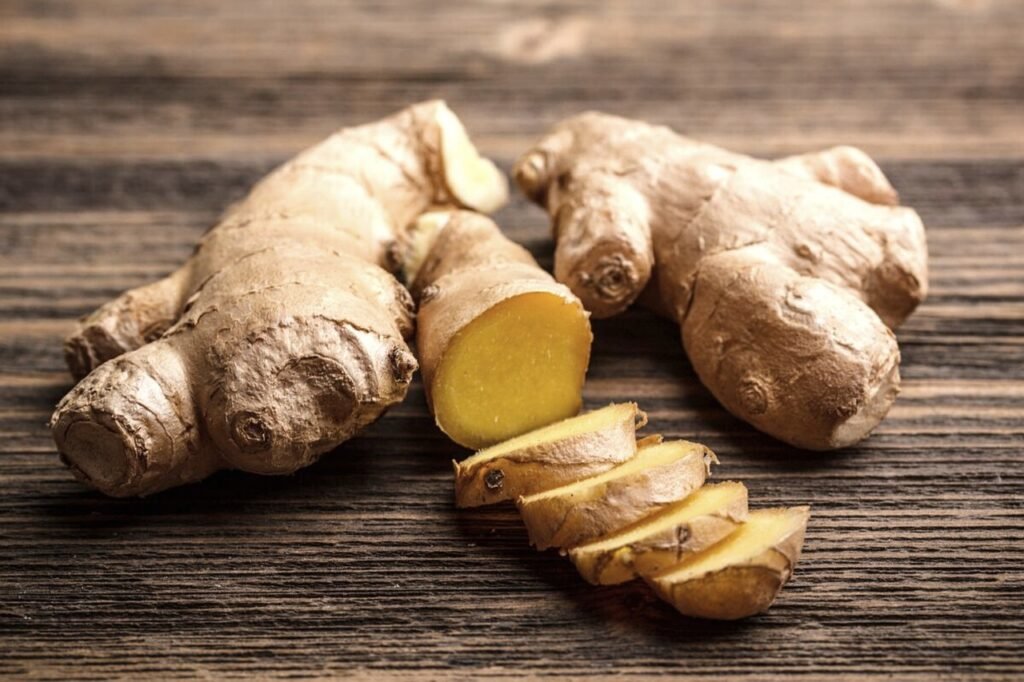Introduction
Ginger chews have emerged as a popular natural remedy that combines the medicinal properties of ginger root with the convenience of a portable sweet. These chewy treats, made from real ginger root that’s been boiled and then coated with sugar, deliver potent health benefits in a small package. As interest in natural health solutions continues to grow, many people are discovering what traditional medicine practitioners have known for centuries: ginger possesses remarkable therapeutic properties. From settling an upset stomach to potentially fighting cancer cells, ginger chews offer an accessible way to harness these benefits while satisfying sweet cravings with a spicy kick.
The History and Cultural Significance of Ginger
Before diving into the specific benefits of ginger chews, it’s worth understanding the rich history behind this remarkable root. Ginger (Zingiber officinale) has been valued for thousands of years, with records of its use dating back to ancient China and India. Traditional Chinese Medicine has long employed ginger to warm the body, stimulate circulation, and treat various ailments.
In many Asian cultures, ginger remains a kitchen staple not just for its flavor but for its medicinal properties. The spread of ginger throughout the world followed trade routes, with the spice becoming highly prized in the Roman Empire and later throughout medieval Europe. By the 16th century, ginger was so valued in England that one pound of it could be traded for a sheep.
Modern science has since validated many traditional uses of ginger, identifying its bioactive compounds and mechanisms of action. This convergence of ancient wisdom and contemporary research has helped elevate ginger and its derivatives—including ginger chews—to prominence in today’s natural health landscape.
What Exactly Are Ginger Chews?
Ginger chews are essentially candied pieces of ginger root. The basic production process involves slicing fresh ginger root, boiling it in water until it becomes tender, and then coating it with sugar. This results in a chewy, spicy-sweet treat that preserves many of ginger’s beneficial compounds.
The marketplace offers numerous varieties of ginger chews, from traditional versions to those enhanced with additional flavors like peanut, apple, coffee, or citrus. Some manufacturers also produce organic versions or varieties with reduced sugar content to appeal to health-conscious consumers.
Each ginger chew typically contains about three grams of sugar, according to USDA data. While this is a consideration for those monitoring sugar intake, many users find that the therapeutic benefits and the small serving size (usually one or two pieces as needed) make ginger chews a reasonable addition to their health regimen.
Unlike some processed candies, ginger chews contain real food ingredients and natural compounds, including gingerols and shogaols—the primary bioactive components responsible for many of ginger’s health benefits.
The Science-Backed Health Benefits of Ginger Chews
Nausea Relief: Nature’s Anti-Nausea Solution
Ginger’s most well-established benefit is its ability to alleviate nausea and upset stomach. According to research cited in Herbal Medicine, ginger works through two primary mechanisms:
- It helps expel intestinal gas that can contribute to stomach discomfort
- It accelerates gastric emptying, helping food move through the digestive system more efficiently
These properties make ginger chews particularly valuable for several types of nausea:
Morning Sickness During Pregnancy
A comprehensive review published in the March 2014 issue of Nutrition Journal found that ginger significantly relieves nausea in pregnant women. For many expectant mothers who prefer to avoid medications, ginger chews offer a natural alternative that can be consumed throughout the day as needed.
Motion Sickness
Whether traveling by car, boat, or plane, many people find that ginger chews help prevent or reduce motion sickness. The portable nature of ginger chews makes them particularly convenient for travelers.
Post-surgical Nausea
Some studies have shown ginger to be effective in reducing nausea following surgical procedures, providing patients with a complementary approach to managing this common side effect.
Chemotherapy-Induced Nausea
A March 2015 article published in Gastroenterology Research and Practice noted that ginger is effective for treating chemotherapy-induced nausea, potentially improving quality of life for cancer patients undergoing treatment.
Powerful Antioxidant Properties
Free radicals—unstable atoms that can damage cells—contribute to aging and various diseases. Antioxidants help neutralize these harmful compounds, and ginger root contains an impressive array of them.
In fact, the antioxidant capacity of ginger is surpassed only by pomegranate and certain berries. These antioxidant properties contribute to ginger’s potential to:
- Reduce oxidative stress in the body
- Support cellular health
- Protect against chronic disease
- Combat premature aging
The concentrated nature of ginger chews means that even a small piece delivers a meaningful dose of these protective compounds.
Anti-inflammatory Effects
Chronic inflammation underlies many serious health conditions, including heart disease, diabetes, and arthritis. Ginger contains natural anti-inflammatory compounds that may help address this root cause of disease.
Studies have shown that the gingerols, shogaols, and paradols in ginger can inhibit the production of pro-inflammatory cytokines and chemokines. This makes ginger—and by extension, ginger chews—potentially valuable for those suffering from inflammatory conditions.
While more research is needed to determine optimal dosage, regularly consuming ginger in forms like ginger chews may contribute to an anti-inflammatory dietary approach.
Potential Cancer-Fighting Properties
According to the March 2015 article in Gastroenterology Research and Practice, ginger and its components have demonstrated effectiveness against several types of cancer, including:
- Gastric cancer
- Pancreatic cancer
- Liver cancer
- Colorectal cancer
- Cholangiocarcinoma (bile duct cancer)
The anticancer potential of ginger appears to work through multiple mechanisms, including inducing apoptosis (programmed cell death) in cancer cells, preventing cancer cell proliferation, and reducing certain inflammatory pathways that contribute to cancer development.
While ginger chews shouldn’t be considered a cancer treatment, they represent a way to regularly incorporate this potentially protective food into one’s diet.
Cognitive Function Support
An often-overlooked benefit of ginger is its potential to support brain health. According to an April 2019 article published by Acta Agriculturae Scandinavica, Section B – Soil & Plant Science, ginger may help combat memory issues that often occur with aging.
The anti-inflammatory and antioxidant properties of ginger appear to protect against neurodegenerative conditions by reducing oxidative stress in the brain. For those concerned about maintaining cognitive function as they age, ginger chews provide a simple way to regularly consume this neuroprotective root.
Immune System Support
The antimicrobial properties of ginger, noted in a June 2019 article published by Foods, suggest that regular consumption may help support immune function. Ginger has demonstrated antibacterial effects against several pathogenic bacteria, potentially helping the body resist certain infections.
Additionally, the anti-inflammatory effects of ginger may help modulate immune response, supporting appropriate immune activation without excessive inflammation that can damage healthy tissues.
Cardiovascular Benefits
Research suggests that ginger may help protect cardiovascular health through several mechanisms:
- Reducing blood pressure
- Lowering cholesterol levels
- Preventing blood clot formation
- Reducing oxidative stress in blood vessels
While these effects have primarily been studied using concentrated ginger extracts rather than ginger chews specifically, regularly consuming ginger in any form may contribute to heart health as part of an overall heart-healthy lifestyle.
Practical Ways to Incorporate Ginger Chews Into Your Routine
For Digestive Support
- Keep ginger chews on hand for occasional stomach upset
- Consume one chew about 30 minutes before meals if you experience regular digestive discomfort
- Use before air travel or road trips to prevent motion sickness
- Keep by the bedside for morning nausea during pregnancy
For Cold and Flu Season
- Enjoy a ginger chew at the first sign of throat irritation
- Combine with warm water (let a chew dissolve in hot water) for a quick ginger tea
- Use as an alternative to throat lozenges
For Exercise Recovery
- Consume after intense workouts to help reduce inflammation
- Use as a natural energy boost before exercise
For Everyday Wellness
- Replace conventional candy with ginger chews for a healthier sweet option
- Keep at your desk for mid-afternoon energy slumps
- Pair with herbal tea for enhanced digestive benefits
Choosing Quality Ginger Chews
Not all ginger chews are created equal. Here are some factors to consider when selecting a product:
Ingredient Quality
Look for products that list real ginger as the primary ingredient (after sugar). Some lower-quality products may use ginger flavoring rather than actual ginger root.
Sugar Content
Check the label for sugar content. While traditional ginger chews do contain sugar, some brands offer options with less added sugar or alternative sweeteners like honey or maple syrup.
Additional Ingredients
Be aware of added preservatives, artificial colors, or flavors. The simplest ingredient lists—typically just ginger, sugar, and perhaps tapioca starch—usually indicate a higher-quality product.
Manufacturing Practices
When possible, choose organic ginger chews, as conventional ginger may be treated with pesticides. Some consumers also prefer products from companies that engage in fair trade practices, particularly since ginger is often grown in developing countries.
Potential Side Effects and Considerations
While ginger chews offer numerous health benefits, they’re not appropriate for everyone in all situations. Here are some important considerations:
Sugar Content
Each ginger chew contains approximately three grams of sugar. While this is relatively low compared to many candies, it’s something to consider for those with diabetes or those following a low-sugar diet. Sugar-free versions are available from some manufacturers.
Possible Digestive Effects
Though ginger is generally helpful for digestion, some people may experience heartburn, gas, or bloating, particularly when consuming larger amounts. Start with a small portion if you’re new to ginger chews.
Medication Interactions
Ginger may interact with certain medications, including blood thinners and some heart medications. If you’re taking prescription drugs, consult with a healthcare provider before regularly consuming ginger chews.
Unknown Concentration of Active Compounds
Since ginger chews are sold as candy rather than supplements, they don’t typically specify the concentration of active compounds. This means the therapeutic dosage may vary between brands and even batches.
Pregnancy Considerations
While ginger is generally considered safe during pregnancy and is often recommended for morning sickness, pregnant women should consult with their healthcare provider regarding appropriate consumption amounts.
DIY Ginger Chews: Make Your Own at Home
For those who want to control the ingredients or enjoy a cooking project, making homemade ginger chews is relatively simple. Here’s a basic recipe:
Ingredients:
- 1 pound fresh ginger root
- 2 cups granulated sugar (plus extra for coating)
- Water
- Pinch of salt
Instructions:
- Peel the ginger root and slice it thinly (about 1/8 inch thick).
- Place in a pot and cover with water. Bring to a boil, then reduce heat and simmer for about 30 minutes until tender.
- Drain the ginger but reserve 1/4 cup of the cooking liquid.
- Return the ginger and reserved liquid to the pot, add sugar and salt, and simmer on low heat until the sugar forms a syrup (about 20 minutes).
- Remove from heat and let cool slightly, then separate the ginger pieces and toss them in additional sugar to coat.
- Allow to dry completely on a wire rack (12-24 hours).
- Store in an airtight container.
Homemade ginger chews can be customized by adding other ingredients like lemon zest, cinnamon, or a touch of cayenne for those who enjoy extra spice.
Ginger Chews Compared to Other Forms of Ginger
Ginger is available in many forms, each with its own advantages:
Ginger Chews vs. Fresh Ginger
- Convenience: Chews are ready-to-use and portable
- Taste: Chews are sweeter and less intensely spicy
- Applications: Fresh ginger is more versatile for cooking
- Preservation: Chews have a longer shelf life
Ginger Chews vs. Ginger Tea
- Concentration: Chews may contain more concentrated ginger
- Consumption experience: Tea provides hydration along with ginger benefits
- Sugar content: Tea can be consumed without added sugar
- Temperature: Tea provides additional benefits from heat
Ginger Chews vs. Supplements (Capsules)
- Enjoyment factor: Chews provide a pleasant taste experience
- Dosage precision: Supplements offer more precise dosing
- Additional ingredients: Chews contain sugar and sometimes other additives
- Accessibility: Chews can be found in many grocery stores, not just health stores
The Environmental and Social Impact of Ginger Production
For the environmentally and socially conscious consumer, it’s worth considering the broader impact of ginger production. Ginger is primarily grown in tropical regions, with major producers including China, India, Nepal, and Indonesia.
Sustainable ginger farming practices include crop rotation, natural pest management, and water conservation. Some producers are now obtaining organic certification, reducing the environmental impact of chemical pesticides and fertilizers.
From a social perspective, fair trade ginger ensures that farmers receive equitable compensation for their labor. When available, choosing ginger chews made with fair trade certified ginger supports ethical labor practices in the global food system.
Conclusion: A Small Treat With Significant Benefits
Ginger chews represent an accessible way to enjoy the numerous health benefits of ginger in a convenient, portable, and pleasant-tasting form. From their proven effectiveness against nausea to their potential role in preventing chronic disease, these spicy-sweet treats offer significant value beyond mere indulgence.
While the sugar content means they should be enjoyed in moderation, ginger chews can be a healthier alternative to conventional candy while delivering active compounds with therapeutic potential. Whether kept in a purse for motion sickness, a bedside table for morning queasiness, or a desk drawer for afternoon tea time, ginger chews bridge the gap between food and medicine in the most delightful way.
As with any health-promoting food or supplement, consistency is key to experiencing benefits. Incorporating ginger chews as part of a balanced, plant-rich diet may contribute to overall wellness while providing a satisfying way to address specific health concerns naturally.


